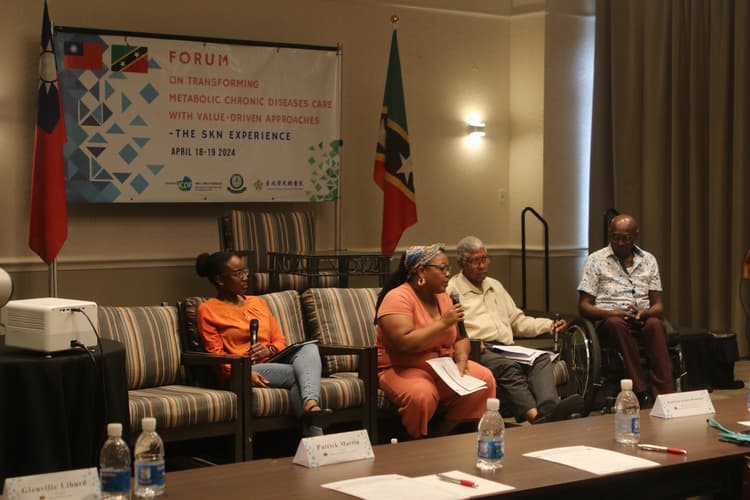You are sweet enough
Global Week for Action on NCDs
Time to Lead
- Edit Column
The Global Week for Action on NCDs kicks off today, 15th October, and runs until 22nd October. This year’s theme, Time to Lead, is especially significant, as leaders from around the world will gather in September 2025 at the United Nations for the fourth High-Level Meeting on Non-Communicable Diseases (NCDs). This meeting presents a pivotal opportunity for world leaders to make strategic decisions that can meaningfully address NCDs globally. Strong leadership is crucial to achieving positive results at this meeting, and the urgency cannot be overstated.
NCDs are a significant threat to the sustainability of nations worldwide. These conditions, such as diabetes, heart disease, stroke, and cancer, have become the leading public health challenge of our time, causing 41 million deaths annually—equivalent to 74% of all deaths globally.
St Kitts and Nevis is not immune to this epidemic. In our Federation, over 80% of deaths are attributed to NCDs, with over 4,000 health centre visits in 2022 alone due to these conditions. The impact of NCDs goes beyond health, as they also have significant economic implications, including reduced workforce productivity, high costs of medical care, and the strain on our healthcare system.
A Call for Leadership: The NCD Alliance's Call-to-Action
In light of these challenges, the organisers of the Global Week for Action on NCDs, the global NCD Alliance, are urging world leaders to show leadership by focusing on five key actions:
Accelerate Implementation: Fast-track national adoption of NCD policy recommendations to make swift progress toward universal health and well-being, ensuring no one is left behind.
Break Down Siloes: Promote cross-sector collaboration to tackle global health and development priorities. By working together, leaders can achieve stronger outcomes that transcend traditional boundaries.
Mobilise Investment: Unlock essential funding for NCD prevention and care, aligning resources with the scale of the challenge. Strategic investments from world leaders can catalyse healthier societies.
Deliver Accountability: Track progress, honour commitments, and ensure sustained efforts towards NCD prevention and care. Leaders must stay true to their promises, holding themselves accountable for better health outcomes.
Engage Communities: Empower community leadership and ensure that people living with NCDs are central to a collaborative response from the global NCD community.

St Kitts and Nevis Responds: A Message from The Minister of Health
How have leaders responded to this call to action? Here in St Kitts and Nevis, our Prime Minister and Minister for Health, the Hon Dr Terrance Drew, has agreed that strong leadership is required to tackle this immense public health issue. In his formal statement for the Global Week for Action on NCDs, he outlined six ways the Ministry of Health is responding:
Global HEARTS Program: Implemented in health centres throughout the Federation, this programme will focus on the prevention and control of hypertension, diabetes, and their complications. It includes training for medical professionals and aims to strengthen cardiovascular disease management at the primary care level.
SKN Moves Initiative: This initiative has promoted a culture of healthy living by promoting physical activity, healthy eating, and regular health screenings to facilitate early detection and treatment of conditions like diabetes and cancers.
Baby Friendly Hospital Initiative (BFHI): Certified in October 2022, this initiative promotes exclusive breastfeeding and optimal infant nutrition, which helps to reduce the long-term risk of developing NCDs.
Enhancing Health Services: The government has invested in recruiting specialised medical staff and acquiring state-of-the-art diagnostic tools, such as CT and MRI machines, to support early diagnosis and improve treatment outcomes.
Strengthening Cancer Prevention: The Federation has been promoting the HPV vaccine among students and collaborating with diaspora surgeons for in-country missions to improve screening and treatment for cancers like colon and prostate cancer.
Policy Development: Key policies such as the Sugar-Sweetened Beverage (SSB) Policy and tobacco control legislation are being developed to address known NCD risk factors, encouraging healthier choices among the population.
You can read the full statement from the Hon Dr Terrance Drew here.
Moving Forward: Building a Stronger Response
Looking ahead, the Ministry of Health plans to reorient and strengthen community-based health services, focusing on primary care and expanding strategic partnerships with local NGOs, the private sector, and regional partners. This collaborative approach is vital for scaling up efforts to prevent and control NCDs.
Lake Health and Wellbeing, as the convenor and secretariat of the St Kitts and Nevis NCD Alliance, commends the government on its efforts to combat NCDs and encourages continued implementation and expansion of its strategy. We also encourage the development and implementation of recommended NCD policies, especially those focusing on prevention, such as healthy food policies (including SSB taxes, trans fat elimination, and salt reduction), promoting physical activity, addressing environmental factors like pollution, and expanding NCD screening.
As we observe the Global Week for Action on NCDs, let us all remember that the time to lead is indeed now. With strong leadership and a united effort, we can create a healthier future for St Kitts and Nevis and the world.
Share With :


